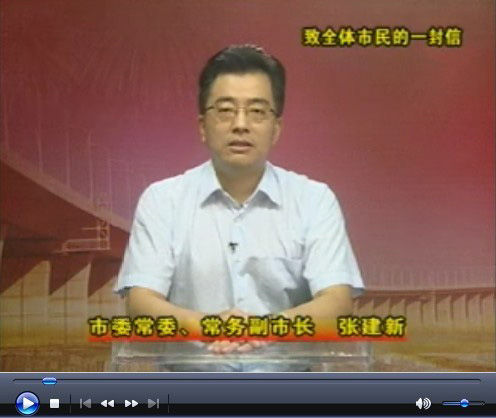Pipeline canceled after thousands protest
 0 Comment(s)
0 Comment(s) Print
Print E-mail China Daily, July 30, 2012
E-mail China Daily, July 30, 2012
A water discharge project was canceled in the coastal city of Qidong, Jiangsu Province, because of strong protests from residents.
 |
|
Zhang Jianxin, deputy mayor of Qidong, said in a statement to the public that the project was still under evaluation and would be "suspended" if residents oppose it. |
In the early hours of Saturday, thousands of people gathered in front of the government office and in adjacent streets to protest a water pipeline project, an investment of Japan's Oji Paper Group.
Zhang Jianxin, deputy mayor of Qidong, said on the city's website on Saturday that the project was still under evaluation and would be "suspended" if residents oppose it.
The government has formed a department to collect residents' complaints and suggestions, Zhang said.
Ding Dawei, Party chief of Nantong, which administers Qidong, said later on Saturday that the wastewater pipeline will be canceled permanently and that the public should trust the government.
Protesters dispersed after the government announced the cancelation of the project on television, the Internet and radio.
Qidong, a city of 1.12 million, is located on the north side of the Yangtze River, facing Shanghai across the river.
The pipeline would have discharged 150,000 tons of wastewater a day into Tanglu Port, one of the city's renowned fishing harbors about 100 kilometers from the Qingcaosha Reservoir, a source of Shanghai's drinking water, according to Zhang Zaifeng, director of Nantong's environmental monitoring center.
"We're afraid the project will severely affect Qidong's fishing industry," a resident who gave her name as Xiao said before the project was canceled. "More than 140,000 people in the city rely on the fishing industry. How can they make a living if the sea is polluted?"
Xiao said that since the construction of the paper factory in Nantong in 2007, Qidong residents kept expressing opposition to the wastewater pipeline.
Liu Weiyi, a 26-year-old resident, said during the protest on Saturday that local police had shown great patience, even when some people grabbed them by their hair and clothes.
Oji Paper denied that the pipeline would cause pollution.
"Our factory in Nantong adopts very strict water quality management measures. We release water after purification, and the water meets national standards," according to a statement on the Chinese website of the Oji Paper Group.
Zhang Zaifeng said that compared with the traditional papermaking industry, modern papermaking is much more environmentally friendly.
"The government of Nantong conducted studies three years ago and concluded that the influence of Oji Paper's wastewater would be very limited and could be totally under control."
"But we cannot be too cautious if it's connected with the health of our children and other family members," said the resident Liu. "We still worry about pollution and prefer that the pipeline is not built in our city."
Tang Jun, a social policy researcher with the Chinese Academy of Social Sciences, said: "It's positive and effective for the local government not to use the force and to cancel the project in a day".
Similar protests over environmental pollution have been reported in China recently, including one this month against the fallout from a copper alloy plant in Shifang, Southwest China's Sichuan province.
"Some local governments failed to release enough information about projects before construction began," Tang said. "They should let the public discuss the issues from the beginning so the public knows more about the projects, dispelling their concerns."
Tang also said that closing all possibly polluting manufacturing industries would improve the environment, but it's not practical.
"A large proportion of the country's population now works in manufacturing," he said.






Go to Forum >>0 Comment(s)